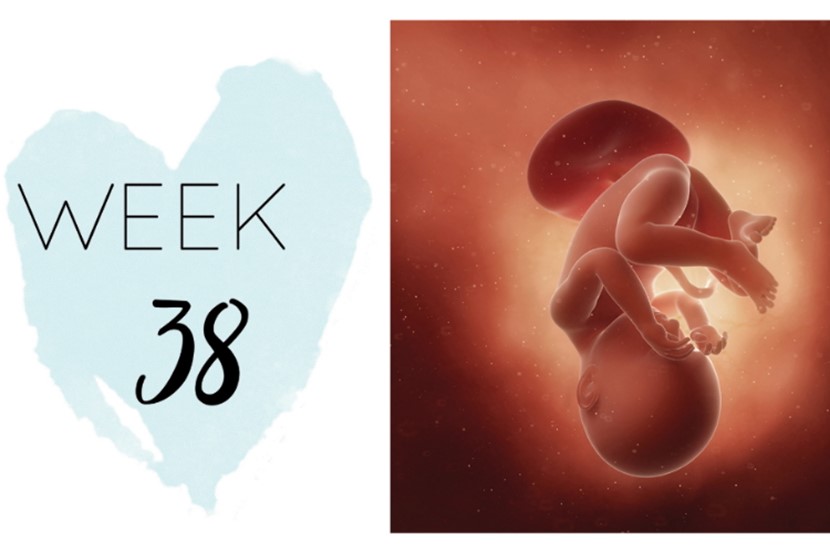38 weeks pregnant

What to expect at 38 weeks pregnant
Are you there yet? Not quite, but it’s close enough that you are now considered full term. Baby could safely arrive any day now. Only 4 to 5% of women deliver on their due date, if you haven’t already got your hospital bag packed, do it now. If you’re pregnant with twins, it’s highly likely your midwife or obstetrician will be wanting you to deliver now if you haven’t already.
Pains when 38 weeks pregnant
You may notice the odd pain in your lower groin, abdominals, and down your legs. This is perfectly normal, and is probably just baby's head becoming engaged against your pelvic floor muscles which aggravates the nerves.
Feeling uncomfortable when nine months pregnant
By now you might be a bit sick of the pregnancy and just want it all to be over. Take it easy on yourself and have a warm bath, or treat yourself to some ice-cream, chocolate, or a pregnancy massage
At this stage of your pregnancy, you might find yourself still gaining- or maybe losing-weight. The baby is growing and your stomach is severely lacking in space, making it hard to eat full meals. Snacks are important, think about the Very Hungry Caterpillar.
As well as a smaller stomach space, there is less room for your bladder. Despite the inconvenience of peeing every two minutes, keep on drinking enough water to keep you and your baby hydrated.
Exercise could be tough by now, but try to do something, whether it’s gentle walks or some gentle yoga. Try breathing exercises too, they can help you to relax. The other thing that could be tough is sleeping. That belly might be uncomfortable, so prop yourself up with pillows behind your back, under your belly, between your legs… anywhere you need support.
Signs of labour at 38 weeks
What’s normal, and what’s not? Keep an eye out for these birth-is-near symptoms:
- Nausea is a common sign of impending labour. Eat bland, small meals.
- Contractions may start- they feel different to Braxton Hicks because they are not alleviated by changed position, they are intensifying, and the times between contractions is getting shorter.
- Diarrhoea is another common labour symptom, your body just doing things in advance in preparation.
- Mucus plug or ‘bloody show’ may appear, although labour could still be a few days or weeks away.
Your baby at 38 weeks pregnant
By now, your baby weighs around 3.1kg and his or her length is around 48cm. Baby is now trying to breathe as his or her lungs are ready for use, and ready for crying. You may notice baby hiccups, which are caused by amniotic fluid getting into the baby’s windpipe.
The circumference of the baby’s head and tummy is about the same. Baby's movements are now fairly limited and you may feel his head against your pelvic floor. You'll still feel baby's legs kicking into your ribs though, he or she is looking forward to getting a good stretch after all those months inside.
If you’re Caucasian, your baby will be born with blue or grey eyes which may change over the next six months. If you’re BIPOC, it’s likely your baby will be born with the brown eyes they will have forever.
Your baby will no longer have vernix or lanugo, but is continuing to add fat, fine-tune the nervous system, and is preparing their first bowel movement. This is called meconium, and is a sticky green-black poo created from dead skin cells, lanugo, and other waste products.
Symptoms not to ignore at 38 weeks
- If you are gaining fluid weight, seeing spots floating in your sight, are feeling dizzy or are suffering from a bad headache, seek immediate medical care. This could be pre-eclampsia.
- If you are experiencing a browny-green discharge, go immediately to the hospital. This is meconium, and is an indication the baby may be in distress.
- Itchy hands and feet? Might be cholestasis, which is a liver function problem. Call your midwife.
How many months pregnant at 38 weeks
You are nine months pregnant.
What can I do to make the baby arrive?
There are a lot of myths about what makes the baby arrive. The ones with no medical evidence include:
- Sex
- Bouncing on a birthing ball
- Raspberry leaf tea
- Cod liver oil (Do NOT consume this as it’s likely to cause extra problems)
- Walking up stairs
The one that is known to work is nipple stimulation. However proceed with caution, as this may speed birth up. Speak to your midwife or obstetrician before pumping colostrum or stimulating your nipples.
| << Week 37 | Week 39 >> |

